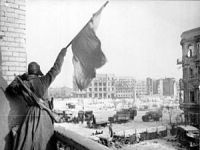Now and always Stalingrad!
A popular proverb says that Russia is never as strong as it seems but never even so weak as it appears. Many foreign armies have experienced this truth reporting sometimes sensational victories or burning defeats. It has often been the Russian winter to be the real architect of the destruction of the enemy armies: tough, ruthless, cold and relentless, seemingly without end. A winter so powerful that seems to get inside yourself, to ice the soul before the meat that envelops it.

Costantino Ceoldo
Even Napoleon, the great French leader, can say something about the Russian winter and how it can to punish those who plans to conquer Russia in short terms, showing these ambitions for what they really are: mere presumption.
There are tales of Italian troops engaged in the campaign of Russia, during the Second World War, which are evidence of the severity of this glacial king: those soldiers went into farmers' isbas seeking for shelter and maybe a bowl of hot soup to escape a cold so absolute that instilled in them the fear that their own spirit come out as deleted. Sometimes inside the huts were a patrol of Russian soldiers that left them warm up and then go away, go back to the enemy after a truce not negotiated and long a few spoonfuls of soup.
The army of the Third Reich has learned the hard way what can be a deadly combination of the cold winter and the extraordinary resilience of the Russian people. Despite the initial successes and victories in a formidable way, the Germans soon clashed with the problems already experienced by other invaders: the width of the front of war, supply lines getting longer, difficult to protect them, lightning attacks of the Russian soldiers, the relentless cold of winter. A bit at a time, the powerful Nazi war machine came to a halt in front of the tenacity, courage and the desire for victory of the Russian people who knew how to resist and fight back, forcing the Germans to withdraw defeated in Berlin and thus ending the Second World War.
The Battle of Stalingrad was one of the bloodiest fought during the Second World War. We leave to the historians recount in detail all the ups and downs of the battle that began July 17, 1942 and ended February 2, 1943 with the surrender of the German General Von Paulus, captured inside the Bag of Stalingrad: beside historiography can be complete and detailed, it can never really tell the mood lived by who was fighting in those days and by who, instead, suffered by the fighting.
Historians can never tell the feelings experienced by the soldiers at the front, their fears, their anxieties. And we will never know, except by hearsay, the moods of civilians who could not escape, tormented by hunger, thirst, filth, disease and cold during the long and terrible siege of the city. A Russian soldier wrote in his diary that even dogs escaped by jumping into the river Volga because the nights of Stalingrad frightened them.
The city bore the name of who commanded the Soviet Union in those years, and Hitler wanted to conquer it as a matter of principle. Stalin wanted to defend it at any cost for the exact same reasons. Stalingrad was a symbol for both sides.
In short it was a carnage, like few other times in history but, it is right to remember, the Russians defended their Motherland against an invading enemy that had already decided which end reserve to them in case of victory: the way of the crematoria, such the Jews.
Stalingrad, now Volgograd, lives in the collective experience of the Russian people to the point that someone has found natural hit the city with terrorist attacks shortly before the Winter Games in Sochi. It is believed that it was the longa manus of Prince Bandar, former head of Saudi intelligence: a way to take revenge on the firmness of President Putin about the Syrian issue.
Throw a bad air in Europe and across the Atlantic. To the point that an entire book would not be enough to analyze in detail the mental illness that afflicts the U.S. political class and, consequently, that of Europe.
Who in their right mind would support the Nazis of Slovoba in the coup in Ukraine? Who, in full possession of his mental faculties, would bring down a government that had earlier recognized as legitimate by using people doing the Roman salute and promises death to the Jews in front of the cameras? Yet this is what happened, with the indifference of the Western media and in the deafening silence of Israel.
But when you are silent on things like these, you actually support them.
The results have been seen in the massacres committed in the Ukrainian squares and in the slaughter of Odessa. It can be seen even now in the fighting in the territories of the Russian-speaking majority, as in the Donbass. There are also Italian volunteers who fought with the Nazis.
Throw a bad air in the so-called free world. Looked so bad that some people in Washington have found natural exalt all the Nazis who there were and send them to fight a new proxy war, yet another, this time nothing less than directly against Russia. You probably also think they could get rid of their puppets when they are no longer useful. What an illusion!
The Americans wink to the Nazis and they are wallowing in the idea that the Russians let them do that, just a few steps away from their borders and forgetting the terrible price Russia has paid the Second World War. Or maybe they trust in an overreaction by the Kremlin, leading to a wider conflict.
It's just typical of madmen not realize their condition!
For the moment, however, the Russian rulers are more sensible than their western colleagues. Not all is lost, but none the less it is increasingly necessary to recall the events of the past that they help us to deal with what is presented in front of us. That is why now and always Stalingrad! The city still retains all its symbolic value and is still a warning to all of us, present and future.
Subscribe to Pravda.Ru Telegram channel, Facebook, RSS!





